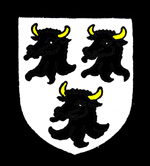William Farrell-Skeffington facts for kids
Sir William Charles Farrell-Skeffington, 1st Baronet (born June 24, 1742 – died January 26, 1815) was an important British soldier. He was the first person in his family to be given the special title of Baronet.
Contents
Early Life and Family Connections
William Charles Farrell was born in London. He was the oldest son of William Farrell, who lived at Skeffington Hall. This hall was a large estate in Leicestershire, England.
On December 9, 1765, he married Catherine Josepha Hubbard. She was the oldest daughter of a merchant named Michael Hubbard from Tenerife.
Becoming a Skeffington
On June 11, 1768, William Charles Farrell changed his last name to Skeffington. He also took on the Skeffington family's special symbols, called "arms." He did this through a "royal warrant," which is a special permission from the King.
He was connected to this old Leicestershire family through his grandmother, Elizabeth Skeffington. This change showed his strong link to their history.
Military Career and Important Roles
William Charles started his military career quite young. On February 11, 1761, he joined the Grenadier Guards, a very famous part of the British army. He started as an ensign, which was a junior officer rank.
He moved up the ranks steadily. By May 27, 1768, he became a lieutenant and captain. This meant he held two ranks at once, showing his importance.
Rising Through the Ranks
On February 5, 1772, he was promoted again. He became a captain and lieutenant-colonel. He was listed in the Army List, which is a record of all officers, until 1778. It is thought that he retired from the army around that time.
Public Service and Leadership
In 1786, William Charles was given the title of baronet. This is a special hereditary title, like a knight, but it can be passed down in the family. Later, he became a deputy lieutenant for Leicestershire. This role meant he helped the Lord Lieutenant, who was the King's representative in the county.
In 1794, he took on another important role. He became the colonel of the Leicestershire Yeomanry. This was a group of volunteer soldiers who helped protect the local area. He held this position from May 9, 1794, until November 1803.
Later Life and Legacy
Sir William Charles Farrell-Skeffington had one son who lived to adulthood, named Lumley St. George Skeffington. Lumley inherited his father's baronetcy, meaning he became the 2nd Baronet after his father's death.
However, Lumley did not inherit the family estate in Leicestershire. Skeffington Hall, its land, and the family library were sold in July 1814. This happened just before Sir William's death in 1815.
 | James B. Knighten |
 | Azellia White |
 | Willa Brown |


